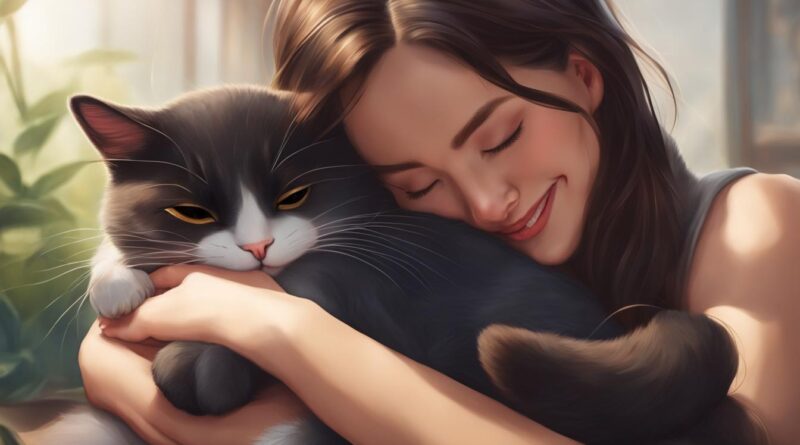Do Cats Love Humans? Feline Affection Explained
When it comes to showing affection, cats have a reputation for being aloof and independent. But are they truly incapable of love? Do cats have affection for humans? Can they bond with us in meaningful ways?
Contrary to popular belief, cats can form strong bonds with humans and show their love in unique and subtle ways. In fact, research has shown that cats have the ability to bond with humans just as deeply as dogs do!
Multiple studies have provided evidence of feline-human bonding and the ways in which cats express their affection for us. From social referencing to voice recognition, cats have fascinating ways of showing their love and connection to their human caregivers.
Key Takeaways:
- Cats are capable of forming strong bonds with humans.
- They exhibit social referencing behavior by looking to humans for cues in unfamiliar situations.
- Cats can recognize their owners’ voices and seek familiarity and comfort in them.
- Cat behavior can be influenced by the personality traits of their human caregivers.
- Signs of cat affection include purring, rubbing against their owners, sitting on laps, and slow blinking.
Understanding Feline Social Referencing
Social referencing is a fascinating concept that describes how individuals seek cues from others to navigate unfamiliar situations. And guess what? Cats aren’t exempt from this behavior! In fact, research has uncovered some intriguing insights into feline social referencing and its implications for their relationships with humans.
One study revealed that a whopping 79% of cats engage in social referencing by observing their human caregivers and gauging their responses in the face of new experiences. It’s almost as if cats look to us for guidance and assurance! This behavior suggests that our furry friends may indeed feel love and form attachments to us.
“It’s almost as if cats look to us for guidance and assurance!”
Just imagine the scene: your cat encounters a new toy or enters an unfamiliar environment. As they cautiously explore their surroundings, their eyes shift to you, seeking cues on how to react. It’s like they’re saying, “Hey, human, is this safe? Should I be afraid or curious?” This reliance on social referencing supports the idea that cats feel a deep connection with their human companions.
So next time your feline friend looks to you for guidance, embrace the opportunity to strengthen your bond. Show them love, patience, and reassurance, and let them know they can trust you. By doing so, you’re not only providing the comfort they seek but also nurturing a mutual affection that can deepen your relationship.

Your Cat: A Curious Observer
It’s important to note that social referencing isn’t limited to unfamiliar situations alone. Cats are curious creatures by nature, and they rely on their caregivers for guidance and emotional support in various contexts.
Whether it’s testing new toys, encountering other animals, or even reacting to sudden noises, cats often turn to their beloved humans for reassurance and guidance. By recognizing this behavior and responding in a supportive manner, you’re building trust and strengthening your bond with your feline companion.
A Cat’s Love: Beyond Words
Cats may not speak our language, but their actions speak volumes when it comes to showing love. From gentle head-butts to cozy snuggles, our feline friends have their own unique ways of expressing affection. Here are some common signs that your kitty feels deeply attached to you:
- Purring: that comforting rumble is a sure sign of contentment and affection.
- Head-rubbing: by marking you with their scent, cats are showing that you belong to their inner circle.
- Sitting on your lap: when a cat chooses your lap as their favorite spot, it’s a clear demonstration of trust and love.
- Slow blinking: when your cat looks at you and slowly closes their eyes, it’s their way of saying, “I trust you completely.”
- Licking: grooming you, just like they groom themselves, is a sign of deep love and attachment.
Remember, each cat is unique, and their displays of affection may vary. Some cats may show their love through playful nibbles, while others may expose their bellies to signal trust. Pay attention to their cues and reciprocate their affection in ways that they appreciate.
| Signs of Feline Affection | Description |
|---|---|
| Purring | A gentle, rhythmic rumble that signifies contentment and happiness. It’s their way of telling you they love you. |
| Head-rubbing | When your cat rubs their head or body against you, they are marking you with their scent and claiming you as part of their family. |
| Sitting on your lap | A cat who chooses your lap as their preferred spot is showing their trust and desire for close physical contact. |
| Slow blinking | When your cat looks at you and closes their eyes slowly, it’s a loving gesture that signifies they feel calm and safe in your presence. |
| Licking | Cats groom each other to strengthen social bonds, so when your cat licks you, it’s a sign of affection and acceptance into their social circle. |
These affectionate behaviors make it clear that cats can indeed form deep attachments and show love to their human caregivers. So, cherish those special moments and continue nurturing the bond you share with your furry friend.
Voice Recognition and Feline Affection
Research has shown that cats have a remarkable ability to recognize their owners’ voices. In a fascinating study, cats were put to the test to see if they could distinguish their owners’ voices from those of strangers. And guess what? They aced it!
This discovery suggests that cats have a deep understanding of human vocal cues. They not only recognize their owners’ unique voices but also seek familiarity and comfort in them. So, the next time you talk to your feline friend, know that they can differentiate your voice from anyone else’s.
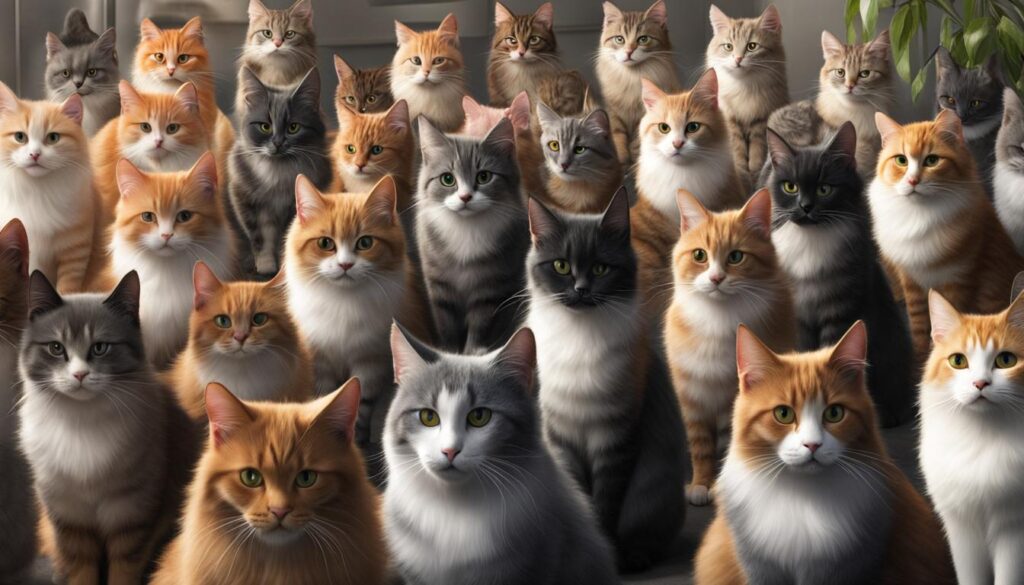
Aren’t cats just purr-fectly amazing? Knowing that your voice is recognized and valued by your beloved feline companion can strengthen the bond between you. It’s like having your own little fan club right at home!
This unique ability highlights the social intelligence of cats and their capacity for forming deep attachments with their human caregivers. It’s another piece of evidence that cats are much more than just independent and aloof creatures.
Do Cats Respond Differently to Their Owners’ Voices?
Further studies have shown that not only do cats recognize their owners’ voices, but they also respond differently to them. When a cat hears the voice of their beloved human, they may exhibit signs of excitement, such as purring, head rubbing, or even seeking physical contact.
“Meow-sic to my ears!” – Felix, a cat enthusiast
This response suggests that cats not only understand human vocal cues but also associate their owners’ voices with positive feelings. Your voice has the power to elicit joy and affection from your furry friend, providing a deeper connection between you.
Creating a Magical Bond Through Voice
So, how can you make the most of this feline voice recognition superpower? Here are a few tips:
- Talk to your cat: Engage in conversations with your cat to strengthen the bond and let them know you’re there for them.
- Use a soothing tone: Cats respond well to calm and gentle voices, so try using a soothing tone when speaking to them.
- Sing a song: Cats may find your singing voice soothing and comforting, so don’t be shy to serenade them every now and then!
By utilizing the power of your voice, you can further enhance the affection and connection you share with your beloved feline companion. Meow-velous, isn’t it?
The Personality Paradox and Cat Behavior
When it comes to understanding cat behavior, we can’t ignore the fascinating relationship between a cat’s personality and their human caregivers. Observational studies have shown that friendly and extraverted cats are more likely to have close and interactive relationships with their humans, creating a delightful paradox in feline behavior.
Just like humans, cats possess unique personality traits that influence how they interact with the world around them. And it turns out, these traits can also shape their interactions with their human companions. Cats with friendly and outgoing personalities are more inclined to seek social interactions and form strong bonds with their humans.
So how does this cat-human interaction work? Well, it’s all about finding the perfect match in personality! Cats can sense when their owners have a similar temperament, and they tend to gravitate towards individuals who share their playful and sociable nature.
Picture this: Imagine a cat with a mischievous glimmer in their eyes, ready to pounce on their favorite feather toy. Now, imagine a human companion with an equally adventurous spirit, always up for playtime. These two kindred spirits share a deep connection that goes beyond the simple act of playing. They understand each other’s need for adventure, making their bond all the more special.
| Cat’s Personality | Human’s Personality | Interactions |
|---|---|---|
| Friendly and Extraverted | Sociable and Playful | Close and interactive relationships |
| Reserved and Introverted | Calm and Gentle | Quiet companionship |
| Curious and Independent | Adventurous and Spontaneous | Exploration and shared adventures |
The table above illustrates the various combinations of cat and human personalities and the resulting interactions. It’s important to note that these connections are not limited to specific personality types, but rather reflect the general tendencies observed in these relationships.
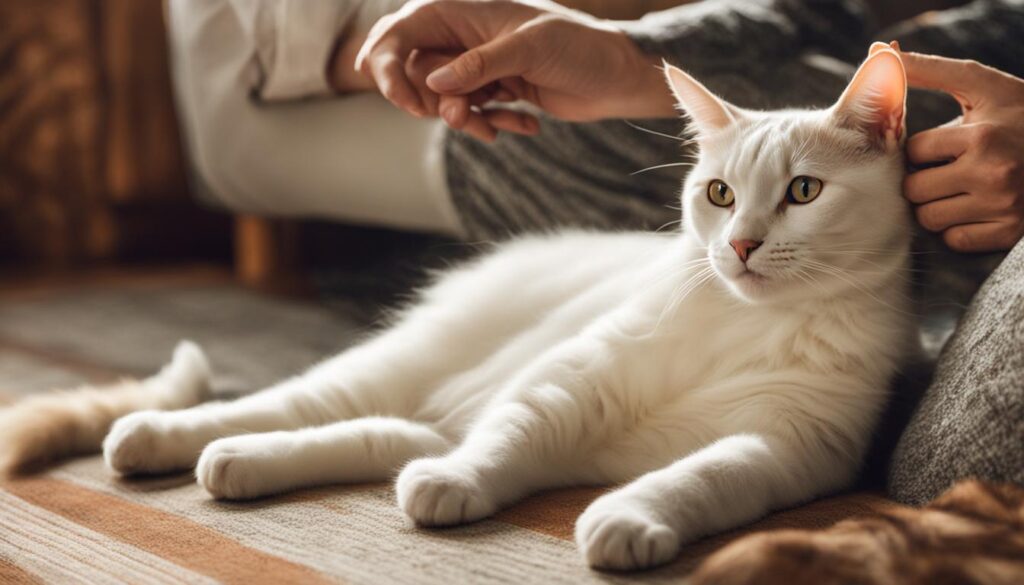
The Benefits of Cat-Human Compatibility
When cats find a human companion who aligns with their personality, magical things happen. Cats feel understood, accepted, and loved for who they are, fostering a deeper bond between them and their human friend.
Furthermore, compatible personalities can enhance the overall well-being of both the feline and their human caregiver. Engaging in activities that align with their shared interests and temperaments can bring joy, excitement, and a sense of fulfillment to both parties.
“A cat’s personality can be a window into their soul, revealing their preferences, quirks, and even their choice of a favorite nap spot. When a human understands and appreciates this unique personality, it paves the way for a special connection that transcends words.”
So, if you’re a playful and adventurous individual, your feline friend might just be waiting for you to whisk them away on thrilling escapades. On the other hand, if you’re a calm and gentle soul, your cat may find solace in your peaceful presence and enjoy quiet moments of companionship together.
Remember, every cat is unique, and their personalities are as diverse as those of humans. Embrace the personality paradox and celebrate the individual quirks of your feline companion. Together, you can form a bond that transcends words and is built upon a shared appreciation for each other’s unique personalities.
Cat Considerations and Cross-Species Attachment
Curious about whether cats think of humans? Wondering if cats display attachment to their caregivers? Let’s dive into the fascinating world of feline-human relationships.
Studies have shown that cats develop distinct attachment styles towards their human companions. These attachment styles demonstrate that cats can form deep emotional connections with their human owners.
“Cats may share social traits once attributed only to dogs and humans, indicating that broader non-canine-specific mechanisms may be needed to explain cross-species attachment and socio-cognitive abilities.”*
So, what does this mean? It means that cats are capable of displaying attachment to their caregivers in ways that were previously thought to be exclusive to dogs and humans. Cats have complex social behaviors and can form meaningful bonds with their human companions.
To further understand the depth of cats’ attachment, let’s take a moment to appreciate the unique bond between cats and humans:
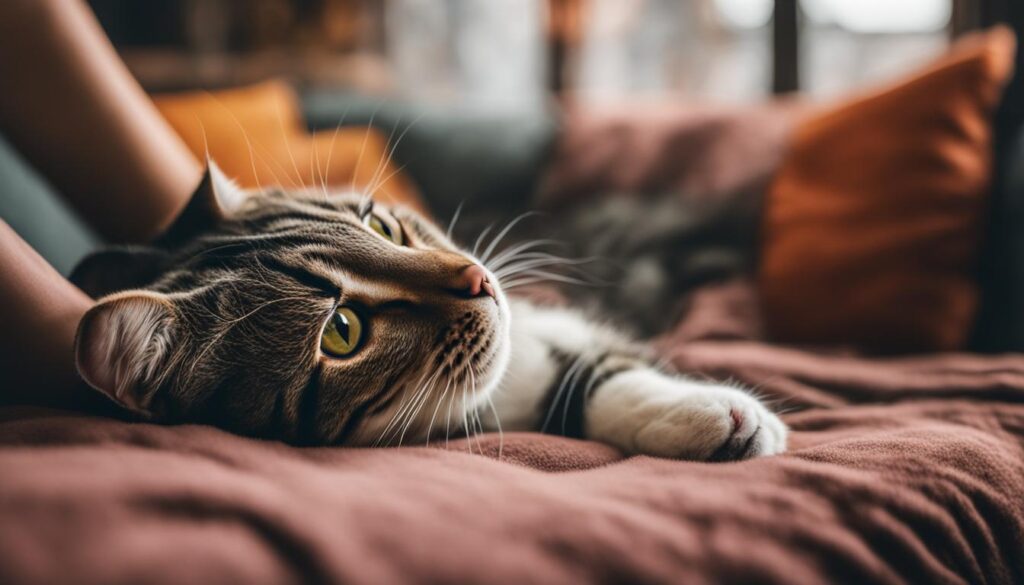
| Attachment Styles in Cats | Description |
|---|---|
| Secure Attachment | Cats with secure attachment show trust and reliance on their caregivers. They seek comfort and support from their owners and demonstrate confidence in their presence. |
| Anxious Attachment | Cats with anxious attachment may display clingy behavior and separation anxiety when their owners are not around. They seek constant reassurance and may become distressed when their routines are disrupted. |
| Avoidant Attachment | Cats with avoidant attachment tend to be more independent and less reliant on their owners. They may distance themselves but still appreciate the presence of their caregivers in their lives. |
As with any relationship, the bond between a cat and its caregiver is unique and can vary from cat to cat. Understanding their attachment style can help foster a stronger connection and provide the right support to meet their emotional needs.
Uncovering the Cross-Species Connection
While cats may not think of humans in the same way humans think of each other, they do form emotional connections with their owners. Cats rely on their caregivers for security, companionship, and affection.
Researchers are continually exploring the intricate dynamics between cats and humans, unraveling the many layers of feline attachments. By appreciating the unique bond between cats and caregivers, we can create a harmonious environment that fosters love, trust, and happiness.
So, the next time you see your feline friend rubbing against your legs or curling up in your lap, remember that they are not only displaying their attachment but also expressing their love for you.
Now that we’ve explored the cross-species attachment between cats and humans, let’s dive deeper into the loyalty of cats in the upcoming section.
*Source: Pawges
Attachment Styles and Loyalty in Cats
Are cats loyal to one person? Do they have specific attachment behaviors? Research has provided some intriguing insights into the relationship dynamics between cats and their human caregivers.
It turns out, some cats are indeed loyal to one person and exhibit unique attachment behaviors. When their chosen person is away, these cats may experience separation anxiety, showing just how deeply they’ve bonded.
While some cats are known for their independent nature, certain breeds are more likely to form strong bonds with one person rather than displaying indiscriminate love. These cats may choose a special person as their favorite human, showering them with affection and seeking their company above all others.
“My cat, Whiskers, is the definition of loyalty. No matter where I go in the house, he’s always by my side. When I leave for work, I can see the longing in his eyes. It’s like he can’t bear to be apart from me,” says feline enthusiast Jane Peterson.
Cats are not only capable of forming attachments but can also develop deep loyalty to specific individuals. Their loyalty is not solely based on receiving food or shelter but stems from a genuine emotional connection.
To better understand the bond between cats and their chosen humans, let’s take a look at a few common attachment behaviors:
1. Follow me everywhere
Many cats with strong attachments will follow their person around the house, constantly seeking their presence and attention. They see their human as a source of comfort and security, always looking to be close.
2. Cuddles and snuggles
Cats who are loyal to one person often enjoy physical contact, seeking cuddles and snuggles whenever possible. They may curl up next to their person on the couch or insist on sleeping in their bed, creating a strong sense of closeness.
3. Separation distress
When their chosen person is away for an extended period, loyal cats may exhibit signs of separation distress. They may become more anxious, vocalize, or engage in destructive behavior until their person returns.
4. Protective behavior
Cats who have formed deep attachments may display protective behavior towards their chosen person. They may become defensive or territorial if they perceive a threat, ensuring their person’s safety and well-being.
Understanding these attachment styles and recognizing the loyalty expressed by cats allows us to appreciate the depth of their emotional connection. It’s a reminder that cats, although often independent, can forge profound bonds that bring immense joy and companionship to our lives.
Through their loyalty and attachment, cats demonstrate their capacity for deep emotional connections with their human companions. Whether they choose one person or show love to a whole household, the bonds formed with cats are special and unique.
Signs of Feline Affection
Curious about how cats show their love for humans? Look out for these signs of feline affection:
- Purring: This soothing sound is one of the most common ways cats express their love. It’s a sign of contentment and happiness in their human’s presence.
- Rubbing: When a cat rubs against you, it’s their way of marking you as their own. It’s a gesture of trust and ownership, showing that they feel secure and comfortable around you.
- Sitting on your lap: If your cat chooses to snuggle up on your lap, it’s a clear indication that they feel safe and bonded with you. It’s a moment of shared warmth and companionship.
- Licking: Cats groom each other to strengthen social bonds, and if your cat licks you, it’s a sign of acceptance and affection. You’re considered part of their family.
- Head-butting: Also known as “bunting,” when a cat presses their head against you, it’s their way of marking you with their scent and showing trust and affection.
- Slow Blinking: When a cat looks at you and slowly blinks, it’s a sign of deep relaxation and trust. It’s commonly referred to as a “cat kiss” and is a loving gesture.
- Exposing their belly: Cats are vulnerable when they expose their belly, so if your feline friend does this, it’s a sign that they feel completely at ease and comfortable in your presence.
- Kneading: If your cat kneads their paws against you or a soft surface, they are mimicking the actions they performed as kittens while nursing. It’s a display of affection and relaxation.
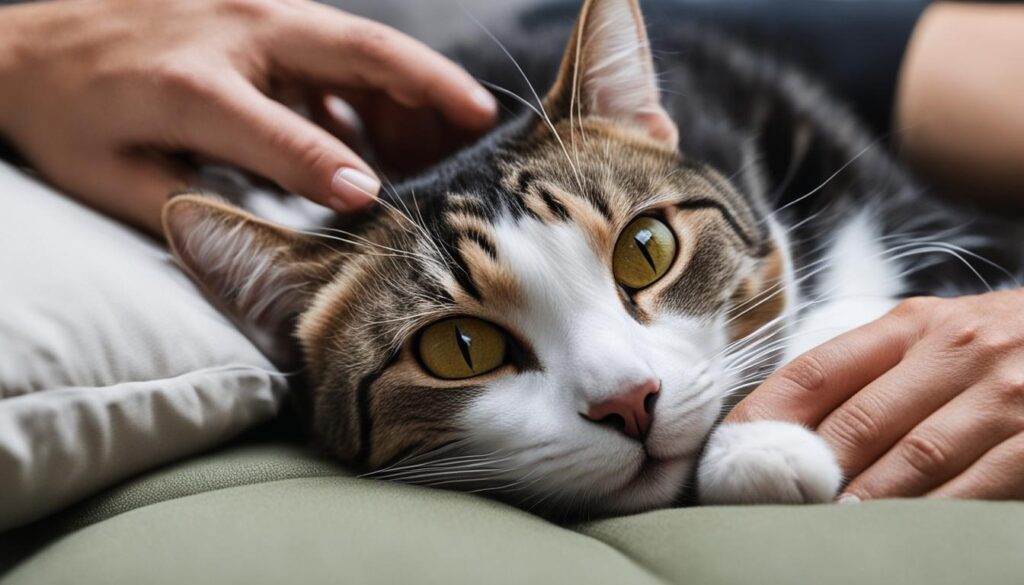
Conclusion
After examining the research, it is clear that cats are more than capable of forming strong bonds with their owners. These feline companions can experience emotions such as joy and contentment when interacting with their human caregivers. Recognizing their owners as part of their family, cats rely on them for both physical and emotional support.
To strengthen the bond with your cat, it is essential to understand their unique communication style and show them respect, love, and patience. Creating a comfortable environment and spending quality time together are key factors in building a strong and loving relationship. Additionally, using positive reinforcement and respecting their boundaries will help cultivate trust and loyalty.
Bonding with your cat not only brings you both joy and companionship, but it also has numerous benefits for your feline friend’s well-being. Studies have shown that a strong human-cat bond can lead to reduced stress levels and improved overall health for cats. So, take the time to strengthen that bond through play, grooming, and creating a safe space for your furry companion.
FAQ
Do cats love humans?
Yes, cats can form strong bonds with humans and show affection in various ways. Research has shown that cats can bond with humans just as meaningfully as dogs do.
Can cats form attachments with humans?
Absolutely! Cats can form deep emotional connections with their human owners and may exhibit attachment behaviors such as separation anxiety when their person is away.
How do cats show love to humans?
Cats show affection to humans in various ways. Common signs of feline love include purring, rubbing against their owner, sitting on their lap, licking, head-butting, and slow blinking. Cats may also display affection by exposing their bellies or kneading their paws.
Do cats recognize their owners’ voices?
Yes, research has shown that cats can recognize their owners’ voices. They are able to distinguish their owners’ voices from those of other people, suggesting that cats have an understanding of human vocal cues and seek familiarity and comfort in the voice of their owners.
Can cat behavior be influenced by human personality?
Observational studies have shown that friendly and extraverted cats are more likely to have close and interactive relationships with their humans. This suggests that cat behavior can be influenced by the personality traits of their human caregivers.
Do cats think of humans? Are they capable of cross-species attachment?
Yes, research has found that cats can share social traits once attributed only to dogs and humans. Cats may form deeper emotional connections with their human companions and display distinct attachment styles towards their caregivers.
Are cats loyal to one person?
Some cats are loyal to one person and may exhibit attachment behaviors such as separation anxiety when their person is away. Certain breeds may be more likely to form strong bonds with one person rather than showing indiscriminate love.
How can I strengthen the bond with my cat?
To strengthen the bond with your cat, it is important to understand their communication and show them respect, love, and patience. Providing a comfortable environment, spending quality time together, using positive reinforcement, and respecting their boundaries can help cultivate a strong and loving relationship with your feline companion.

